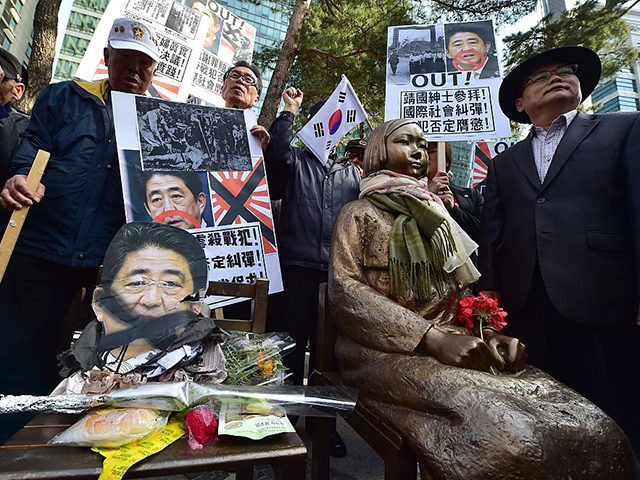Japanese officials reacted angrily on Tuesday to the construction of a statue in Pyeongchang, South Korea, appearing to depict Japanese Prime Minister Abe Shinzo kneeling and bowing to a seated “comfort woman.”
“Comfort women” is a term used for South Korean women, believed to number in the hundreds of thousands, that Imperial Japanese soldiers forced into sex slavery during World War II.
South Korean officials erected the statue, named “Eternal Atonement,” this week on the grounds of the privately-owned Korea Botanic Garden in Pyeongchang, Gangwon Province.
Japan’s chief cabinet secretary, Yoshihide Suga, told a news conference in Tokyo that if the statue is indeed of Abe then it would represent an “unforgivable” violation of international and diplomatic protocol.
“While we have yet to confirm this, it would be unacceptable under international courtesy,” he told reporters. “If the reports are accurate, then there would be a decisive impact on Japan-Korea relations.”
The manager of the privately run botanic garden, Kim Chang-ryul, who commissioned the statue, denied that it was a deliberate depiction of Abe but rather anyone in a position to apologize for the historic crimes, which took place during Japan’s 1910-1945 colonial rule over a formerly unified Korea.
“If that person is Abe, then that would be good,” Kim told Reuters, adding that he had not “anticipated the statue inflaming an already complicated diplomatic issue.”
South Korea’s Foreign Ministry reacted cautiously to the matter, admitting that it may represent a breach of protocol but pointing out that it was erected by a private citizen. Similar statues of the victims have also been constructed in front of the Japanese Embassy in Seoul and in other parts of the country.
“The government believes it is necessary to consider international comity in regards to foreign leaders,” Foreign Ministry spokesperson Kim In-Chul said at a news briefing. “I have no more explanation to add for now.”
Despite being neighboring, democratic, wealthy, and technologically advanced nations, Japan and South Korea have been engaged in a long-running diplomatic dispute over the issue of comfort women. Last year, the two countries imposed tit-for-tat trade restrictions on each other after Tokyo took issue with the ruling that Japanese companies must pay compensation to the families of the sex slaves.
Tensions between the two governments have arisen following South Korea’s election of leftist Moon Jae-in in 2017. Shortly after entering office, Moon publicly criticized a compensation deal struck by the previous government, describing it as “seriously flawed.” Abe, a conservative, considers the matter closed given the signing of that agreement and has repeatedly insisted that his government will not re-open any aspect of it.
Follow Ben Kew on Facebook, Twitter at @ben_kew, or email him at bkew@breitbart.com.

COMMENTS
Please let us know if you're having issues with commenting.